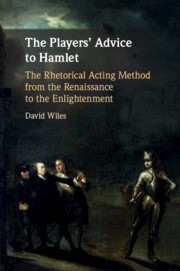
-
Select format
-
- Publisher:
- Cambridge University Press
- Publication date:
- January 2020
- February 2020
- ISBN:
- 9781108689502
- 9781108498876
- 9781108712811
- Dimensions:
- (228 x 152 mm)
- Weight & Pages:
- 0.74kg, 378 Pages
- Dimensions:
- (229 x 152 mm)
- Weight & Pages:
- 0.56kg, 382 Pages
You may already have access via personal or institutional login
Book description
Hamlet is a characteristic intellectual more inclined to lecture actors about their craft than listen to them, and is a precursor of Enlightenment figures like Diderot and Lessing. This book is a quest for the voice of early professional actors, drawing on English, French and other European sources to distinguish the methods of professionals from the theories of intellectual amateurs. David Wiles challenges the orthodoxy that all serious discussion of acting began with Stanislavski, and outlines the comprehensive but fluid classical system of acting which was for some three hundred years its predecessor. He reveals premodern acting as a branch of rhetoric, which took from antiquity a vocabulary for conversations about the relationship of mind and body, inside and outside, voice and movement. Wiles demonstrates that Roman rhetoric provided the bones of both a resilient theatrical system and a physical art that retains its relevance for the post-Stanislavskian performer.
Contents
Metrics
Altmetric attention score
Full text views
Full text views help Loading metrics...
Loading metrics...
* Views captured on Cambridge Core between #date#. This data will be updated every 24 hours.
Usage data cannot currently be displayed.
Accessibility standard: Unknown
Why this information is here
This section outlines the accessibility features of this content - including support for screen readers, full keyboard navigation and high-contrast display options. This may not be relevant for you.
Accessibility Information
Accessibility compliance for the PDF of this book is currently unknown and may be updated in the future.


